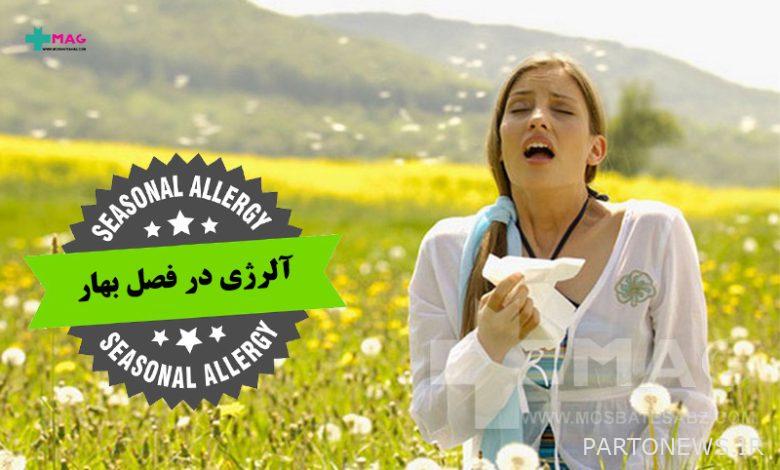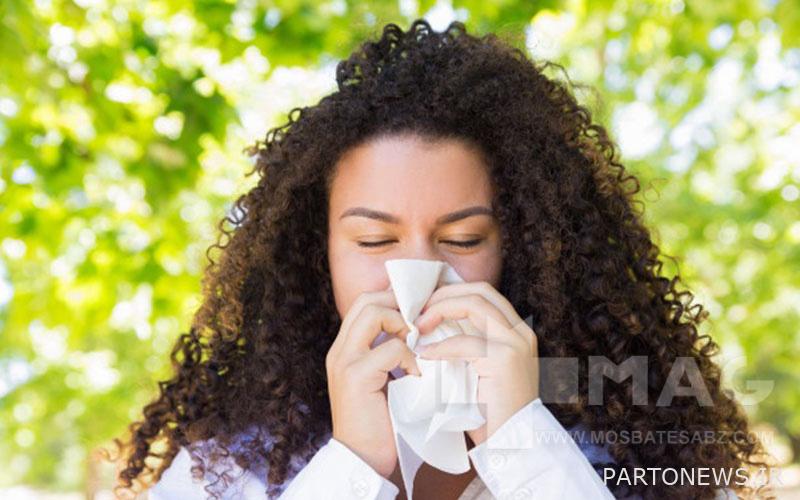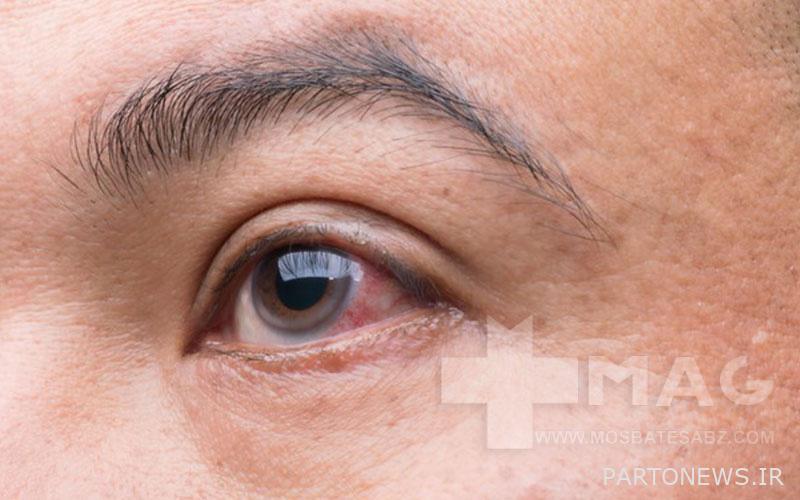Allergies in the spring (symptoms, prevention and treatment)

If you have allergies, you may experience many problems, but you should know that 10 to 30% of people in the world have allergies and asthma, and you are not alone. Over the past fifty years, the incidence of various types of allergic diseases has increased in many countries around the world, and allergies are found in all age and sex groups. In the spring, allergies get worse for many people, which is why they designate the first Tuesday in May, which is almost mid-May, as World Allergy Day. What causes allergies in the spring? How can it be prevented or treated?
What we read in this article
Cause of allergies in the spring
Spring, with all its stunning beauty, is a nuisance for people with allergies. When it comes to pollinating the season, sneezing and runny nose are among the least common complications in people with allergies. Trees, weeds, and weeds release their pollen into the air to help plants fertilize.
When these pollens enter the body of an allergic person, the body’s immune system reacts to them; Pollen is mistaken for a threat to human health and produces antibodies against it to attack allergens. This action causes the secretion of a chemical called histamine into the blood. Histamine causes runny nose, itchy eyes, sneezing and other symptoms that seem quite familiar to people with allergies.
Pollen can travel miles to reach you, so allergies are not limited to trees and plants near you.
Trees and grasses that cause allergies
Trees that cause allergies include:
- Alder, spruce, poplar, beech, box maple, cedar, cypress, elm, tropical walnut, cypress, maple, berry, oak, olive, palm, pine and willow
The following weeds and weeds can also be allergenic:
- Bermuda, Johnson, rye and Timothy
On days when the wind blows more than ever, the likelihood of allergy symptoms increases because the pollen can travel longer distances and also move faster.
Allergy symptoms in the spring
Allergies in the spring are associated with the following symptoms:
- runny nose
- Tears fall from the eyes
- Sneezing
- Cough
- Itchy eyes or nose
- Blurring under the eyes
- Headache and dizziness
- Fatigue
Shortness of breath is more common in cases where the person already has respiratory problems. Because shortness of breath can lead to heart or even brain problems, people with allergies and symptoms of shortness of breath should be monitored by a doctor so that their health is not endangered.

Allergy diagnosis
It is best to see an allergist or ENT specialist to diagnose allergies. A specialist doctor may use a variety of tests to diagnose your allergy and its type. Some tests may be skin or you may have to have a blood test. The diagnosis of allergy should be left to a competent doctor because it has very common symptoms with colds and sinusitis.
Treatment of seasonal allergies
Related Posts
Allergies and seasonal allergies can occur in any season other than spring. Unfortunately, there is no definitive cure for any type of allergy. The longer you stay away from allergens, the less likely you are to develop allergies. For this purpose you can:
- Check the amount of pollen in the air through the country’s climate sources and do not leave the house on days when the number of pollens is high.
- Close doors and windows at home and ventilate the air using a ventilator.
- Close your car windows while driving.
- Clean your home regularly with a vacuum cleaner.
- Be sure to shower before going to bed as many plant pollens can stick to your body or hair. Also, wash your clothes and put on other clothes every time you enter the house.
- Avoid drying your clothes outdoors as pollen can also stick to wet clothes.

Pharmacological treatment
In fact, medications used to treat allergies can only reduce the severity of the symptoms and certainly do not cure them. Some of these medications include the following:
- antihistamine
- Anti-nasal congestion
- Nasal steroid sprays
- Eye drops
In addition to medication, some home remedies can also be used:
Home treatment of allergies in the spring
If you prefer to use home remedies and herbal remedies to improve your allergy symptoms in the spring, consider the following:
- Butterbur is one of the best plants that can be effective in reducing allergy symptoms. This plant has properties similar to antihistamines and citrizin and controls allergic reactions.
- Use nettle leaves; It is believed that this plant is effective in reducing the amount of histamine.
- Use probiotic products like yogurt. This type of dairy product supports the immune system of people, especially children, against allergic rhinitis.
- Rinse your nose regularly.
- Take a hot shower to not only cleanse the sinuses but also flush out plant pollen.
- Use eucalyptus oil to relieve your allergies. For this purpose, you can rub 3 drops of it on your chest or pour some of it into a small bowl and place it on your desk.
- According to studies, the use of acupuncture can also help improve allergies.
What exercises are useful for seasonal allergies?
People with spring allergies have difficulty doing some exercise because pollen worsens their allergies and it may sometimes be impossible to get out of the house. As you probably know, exercise improves the immune system and helps cleanse the body and improve blood circulation. Water sports can be very beneficial for people with allergies. Care should be taken not to use chlorine in the pool if it is used as it may aggravate allergy symptoms. Other exercises such as yoga and Pilates that focus on deep breathing can also help alleviate allergies.

Seasonal allergies and corona vaccines
Most people around the world now receive several doses of the Corona vaccine to protect themselves against the Covid-19 virus. But some people still ask questions about seasonal allergies and the corona vaccine. If you have allergies in the spring or other seasons, there is no contraindication to getting the Corona vaccine. Of course, people who have a history of anaphylaxis or have allergic reactions after taking other doses of Corona vaccine should get the next dose of this vaccine in consultation with their doctor.
The difference between seasonal and coronary allergy symptoms
Seasonal allergies are usually never accompanied by fever or pain. So if you have these symptoms and other symptoms such as sore throat, you are definitely Covid-19. Runny nose and cough are common symptoms between seasonal allergies and coronary heart disease. For this reason, it may be best to see a doctor for a more specialized diagnosis. If other people besides you have similar symptoms at home or at work, you should still suspect coronary heart disease because it is a viral disease. While the cause of seasonal allergies is not related to viruses and bacteria.
Treatment of seasonal allergies in traditional medicine
Traditional medicine has some tips for treating allergies in the spring that you should pay attention to:
- Avoid overeating and do not eat fatty foods that are slow to digest.
- Use quail and partridge instead of slow-digesting meats.
- Avoid salty and sour foods and watery fruits.
- Eat simple meals with plums or pomegranates at least 2-3 times a week.
- Eat lettuce and peppermint to reduce the severity of dry and itchy skin.
- Do not use spicy spices.
- Do not expose yourself to cold winds and wear appropriate clothing.
- When sleeping, place your head higher than your body.
- Eat chamomile to reduce runny nose.
- Avoid taking a bath when the symptoms are severe.
- Use rose water topically to help relieve itching.
- Consumption of sorrel, orange, barberry juice, chicory juice and lemon juice is recommended.
In traditional medicine, it is believed that seasonal allergies are more likely to occur in people who have a hot temper or have a mild temper due to certain diseases or poor nutrition.
last word
There are different types of allergies, one of the most common of which is called seasonal allergies, which most often occur during the spring. In this article, we examined the symptoms of allergies in spring, its cause and ways. With the help of the solutions presented in this article, you can help control this complication and relieve your symptoms.
Please rate this article
[مجموع: ۳ میانگین: ۴.۷]


